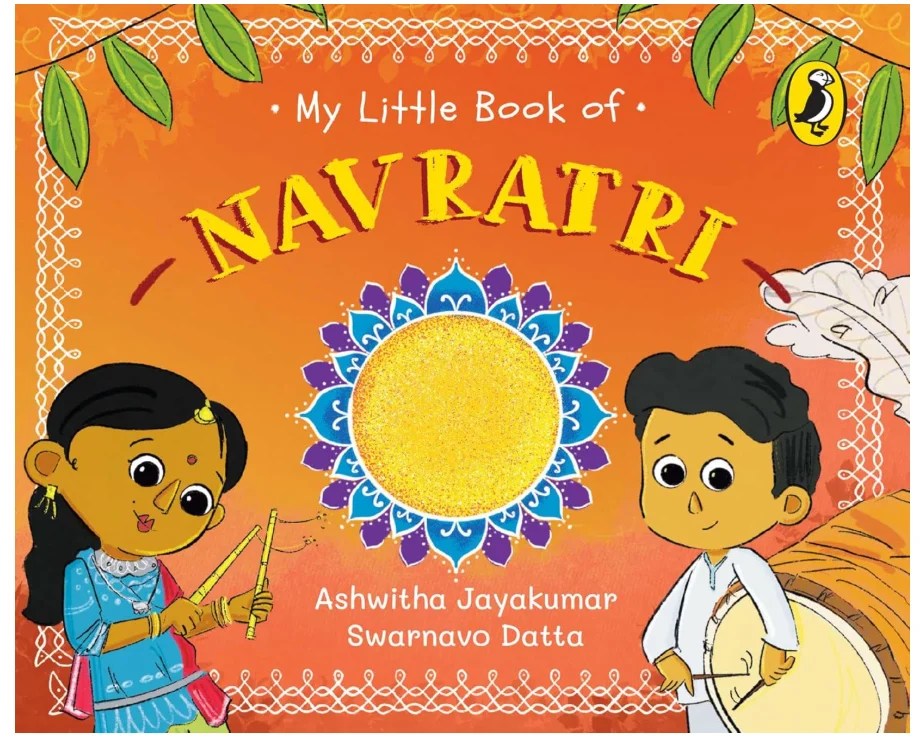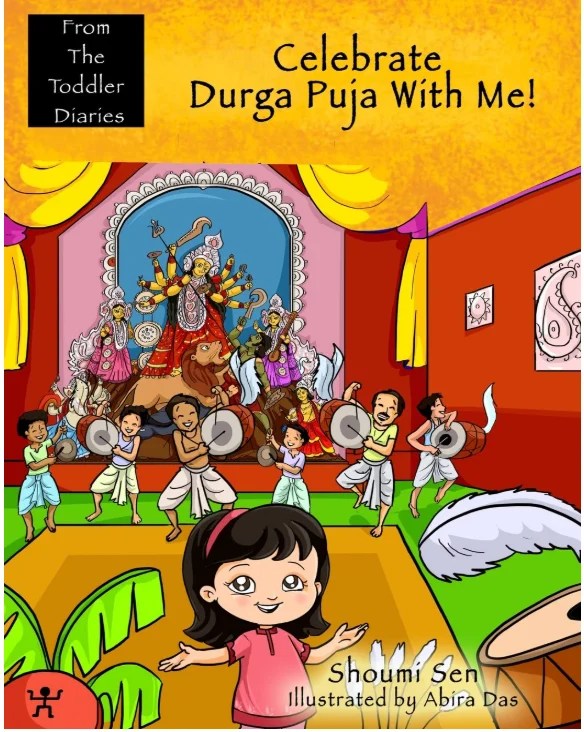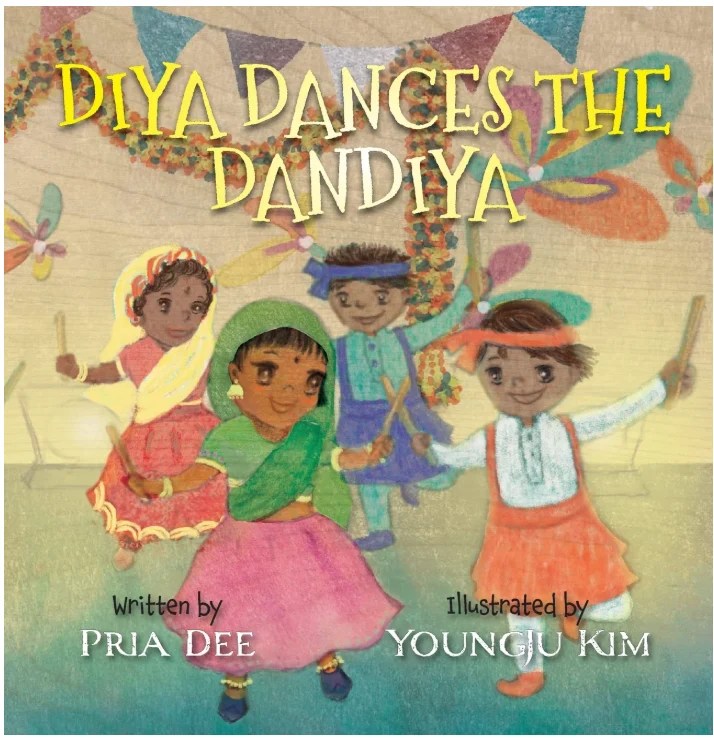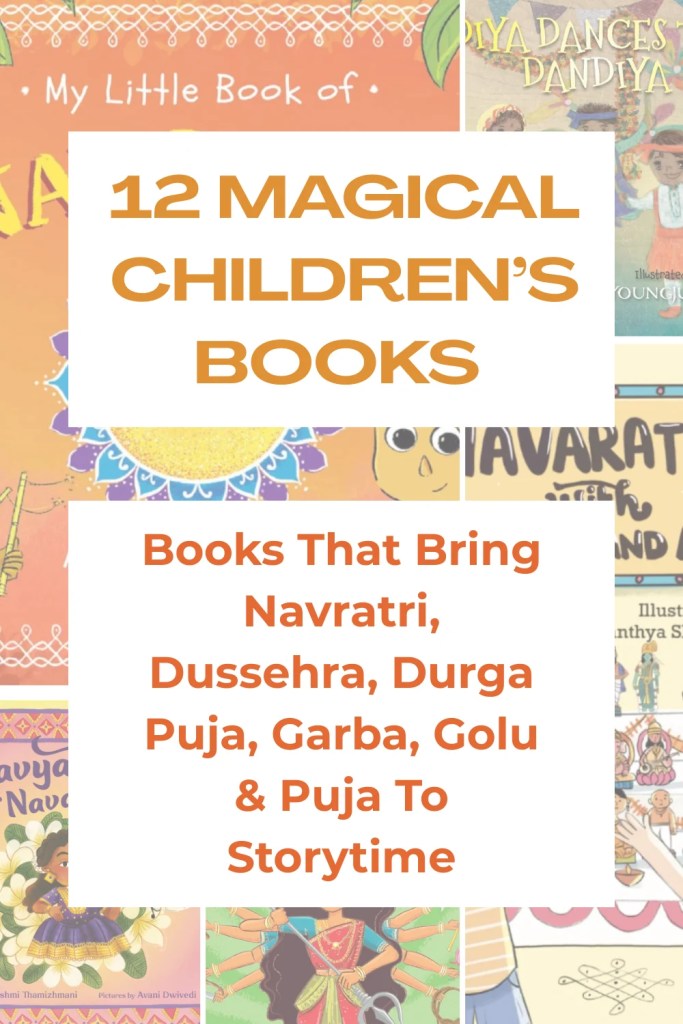Last updated on December 28th, 2025 at 10:16 pm
Disclaimer:
As an Amazon Associate, I earn from qualifying purchases. This means that if you click on an Amazon link on this site and make a purchase, I may receive a small commission at no extra cost to you. This helps support the work I do here. Thank you for your support!
Indian festivals are more than just colors, lights, and sweets—they’re stories, values, and memories passed down through generations.
Among the most vibrant is the festival of Navratri, which celebrates courage, goodness, and the power of the divine feminine.
Sharing these stories with children can make these celebrations truly magical.
Why Storytelling Makes Festivals Magical for Kids
Kids connect with traditions best through stories. Navratri, for example, celebrates the nine forms of Goddess Durga.
Each day brings a new tale of bravery, wisdom, and kindness.
Explaining the symbolism behind her weapons, her lion, and her triumphs teaches children about resilience and the triumph of good over evil, making the festival meaningful beyond the lights and dances.
Durga Puja: Experience the Goddess’s Stories
Durga Puja takes storytelling to a grand scale. Elaborate pandals and beautifully crafted idols introduce children to the goddess’s many forms.
Walking through these festivals, kids can see the stories in action—learning that rituals, prayers, and celebrations carry deeper meaning and timeless lessons.
Dussehra: Lessons from Lord Rama and Ravana
Dussehra brings stories to life in a way that captivates children. From Lord Rama’s courage to Ravana’s downfall, this festival shows the victory of virtue over vice.
Watching Ravana’s effigy burn becomes not just a spectacle, but a visual story about consequences, morality, and justice.
Golu Celebrations
Golu, or the display of dolls and figurines during Navratri, is a wonderful way to introduce children to storytelling and cultural heritage.
Kids enjoy arranging the dolls, learning about each character, and listening to the tales behind them.
This hands-on activity sparks creativity, encourages curiosity, and helps children appreciate the rich traditions and folklore of Indian festivals in a fun and interactive way.
ALSO READ >>> Navratri Celebrations Across India
Garba and Dandiya Celebrations
Garba and Dandiya are more than just lively dances—they’re a way to bring the stories of Navratri to life for children.
Each rhythm, twirl, and playful clash of sticks can be paired with tales of Goddess Durga’s courage and triumph, helping kids connect movement with meaning.
The books featured later in this blog can be read aloud before or after dancing, turning every garba circle or Dandiya session into an interactive storytime.
How to Make Festival Traditions Interactive
Participation is key. Asking questions, expressing thoughts, and imagining themselves in the stories helps kids connect emotionally to their heritage.
ALSO READ >>> Navratri Through the Years: Personal Reflections
Beyond fun, these festivals teach important life lessons: courage, empathy, perseverance, and respect.
Framing stories in age-appropriate ways enables children to naturally understand morals and ethics.
In a world dominated by screens, storytelling during festivals bridges generations.
Celebrating Navratri, Durga Puja, and Dussehra through stories connects children to culture and traditions—even if they live far from India.
It transforms rituals into meaningful experiences, inspiring pride in their roots and allowing them to create memories that last a lifetime.

My Little Book of Navratri by Ashwitha Jayakumar, Swarnavo Datta
Recommended Age – 3 years and up
Format – Board Book
From feeling the beat of the dhak in Durga Puja pandals to twirling to the rhythm of dandiya sticks, the book captures the festive mood beautifully.
What makes this book especially delightful is the way it mixes storytelling with interactivity. Dotted with fun facts and a seek-and-find activity, it keeps little ones engaged while teaching them about India’s rich cultural fabric.

My Little Book of Durga by Penguin India Editorial Team, Ashwitha Jayakumar (Contributor), Swarnavo Datta (Contributor)
Recommended Age – 3-5 years
Format – Board Book
My Little Book of Durga is a delightful board book that introduces children to the story of Goddess Durga and her triumph over Mahishasura. With simple language, vibrant illustrations, and interactive elements, it’s a perfect way for young readers to learn about Shakti.

My Little Book of Nava Durga: Celebrate the Nine Forms of Goddess Durga This Navratri by Nalini Ramachandran, illustrated by Priyanka Pachpande
Recommended Age – 1- 4 years
Format – Board Book
My Little Book of Nava Durga is a beautifully illustrated board book that introduces children to the nine forms of Goddess Durga celebrated during Navratri.
With simple language, vibrant artwork, and child-friendly storytelling, it’s a wonderful way to help little readers connect with mythology and the spirit of the festival.

Amma Tell Me About Durga Puja! by Bhakti Mathur
Recommended Age – 2-8 years
Written in rhyme and paired with vibrant illustrations, the Book follows Klaka and Kiki as they experience the joy of pandal hopping, offering Pushpanjali, dancing to the beat of the dhaak, and learning how Ma Durga defeated Mahishasura.

Dancing the Navaratri Nights by Mayuri V Amarnath, illustrated by Ravi Shankar
Recommended Age – 3 -10 years
A heartwarming story set in Gujarat, where young Aarti dreams of becoming a dancer during the vibrant Navratri celebrations. Through her journey of nine festive nights, filled with dance, devotion, and family, she learns that true blessings from Goddess Durga come not just from talent, but from sincerity and a heart.

Navya Sings for Navarathri by Lakshmi Thamizhmani, illustrated by Avani Dwivedi
Recommended Age – 4-8 years
Format – Picture Book
A touching and empowering picture book that celebrates the nine nights of Navarathri through the eyes of young Navya. While she enjoys the traditions of family gatherings and Golu hopping, she struggles with stage fright when it comes to singing.
With encouragement from her family and inspiration from Goddess Durga, Navya discovers the strength within herself to overcome her fear.

The Doll That Bommakka Made by Praba Ram, Sheela Preuitt, Illustrated by Debasmita Dasgupta
Recommended Age – 4-6 years
A picture book inspired by the traditional Bommai Golu dolls displayed during Navaratri. It follows the journey of a doll lovingly crafted by Bommakka, showing each step of its creation until it takes its place in the festive display.
This book beautifully highlights themes of creativity, heritage, and celebration, making it a perfect pick for families who want to connect little readers with Indian festivals and crafts.

Celebrate Durga Puja With Me! (From The Toddler Diaries) by Shoumi Sen, illustrated by Abira Das
Recommended Age – 1-5 years
Celebrate Durga Puja With Me! brings the festival to life through the eyes of toddler Riya, capturing the colors, rituals, and joy of the five days of Pujo.
With playful illustrations and simple, poetic storytelling, it’s a delightful way for young children to experience the magic of Durga Puja.

Nava Durga: The Nine Forms of the Goddess by Nalini Ramachandran
Recommended Age – 5-9 years
Nava Durga: The Nine Forms of the Goddess is a beautifully illustrated and thoroughly researched book that introduces children to the nine powerful forms of Goddess Durga and the diverse Navaratri traditions across India.

Navarathri with Vikram and Aadhi (Vikram book series) by Sushima Shekar, illustrated by Santhya Shenbagam R.
Recommended Age – 0-8 years
Navarathri with Vikram and Aadhi is a colorful and engaging story that follows two Indian-American children as they experience their first Navarathri Golu in India.
With vibrant illustrations and a delightful narrative, it’s a fun way for young readers to learn about festival traditions and family celebrations.

Diya Dances the Dandiya: An enchanting story set in the Indian celebration of Navaratri! by Pria Dee, illustrated by YoungJu Kim
Recommended Age – 2-8 years
Diya Dances the Dandiya is a Navaratri story following little Diya and her brother Ramu on a fun quest to find her missing anklets before her dance performance.
With engaging storytelling and festive charm, it’s a perfect read for children to enjoy the excitement of Navaratri and dandiya celebrations.
ALSO READ >>> Navratri: Nine nights of worship and celebration





